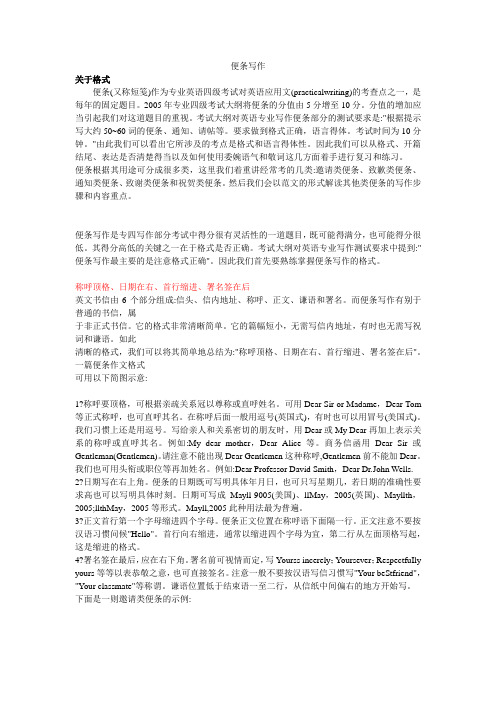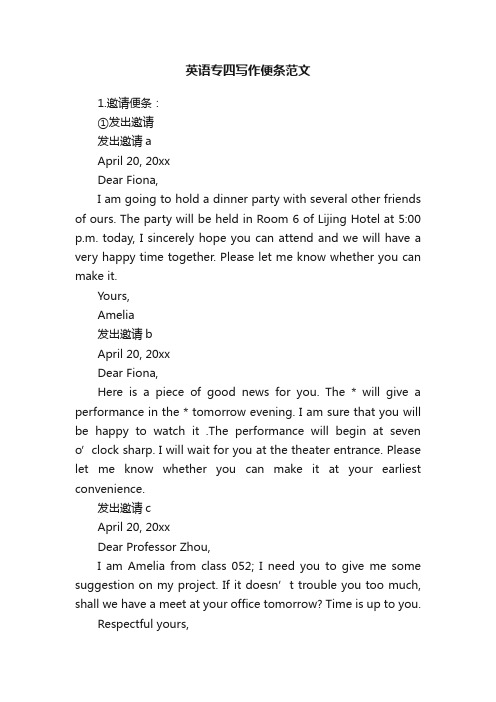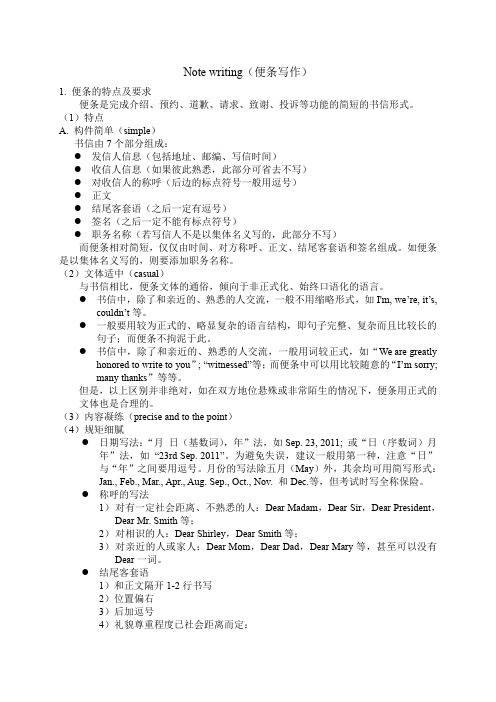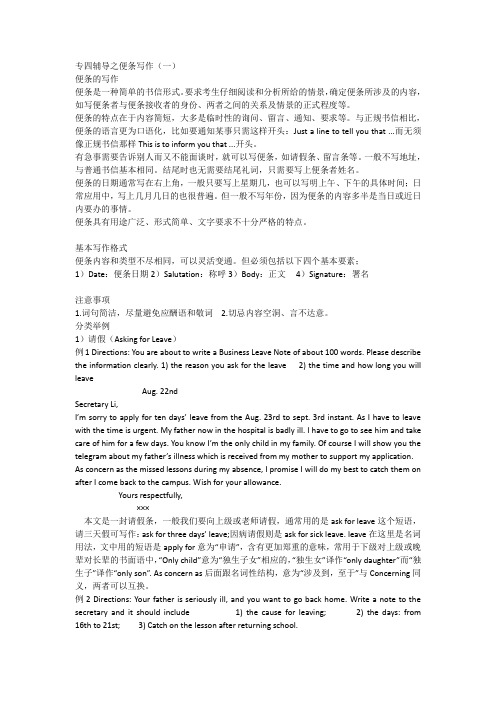英语专业四级便条写作策略
便条写作格式与范文

便条写作关于格式便条(又称短笺)作为专业英语四级考试对英语应用文(practicalwriting)的考查点之一,是每年的固定题目。
2005年专业四级考试大纲将便条的分值由5分增至10分。
分值的增加应当引起我们对这道题目的重视。
考试大纲对英语专业写作便条部分的测试要求是:"根据提示写大约50~60词的便条、通知、请帖等。
要求做到格式正确,语言得体。
考试时间为10分钟。
"由此我们可以看出它所涉及的考点是格式和语言得体性。
因此我们可以从格式、开篇结尾、表达是否清楚得当以及如何使用委婉语气和敬词这几方面着手进行复习和练习。
便条根据其用途可分成很多类,这里我们着重讲经常考的几类:邀请类便条、致歉类便条、通知类便条、致谢类便条和祝贺类便条。
然后我们会以范文的形式解读其他类便条的写作步骤和内容重点。
便条写作是专四写作部分考试中得分很有灵活性的一道题目,既可能得满分,也可能得分很低。
其得分高低的关键之一在于格式是否正确。
考试大纲对英语专业写作测试要求中提到:"便条写作最主要的是注意格式正确"。
因此我们首先要熟练掌握便条写作的格式。
称呼顶格、日期在右、首行缩进、署名签在后英文书信由6个部分组成:信头、信内地址、称呼、正文、谦语和署名。
而便条写作有别于普通的书信,属于非正式书信。
它的格式非常清晰简单。
它的篇幅短小,无需写信内地址,有时也无需写祝词和谦语。
如此清晰的格式,我们可以将其简单地总结为:"称呼顶格、日期在右、首行缩进、署名签在后"。
一篇便条作文格式可用以下简图示意:1?称呼要顶格,可根据亲疏关系冠以尊称或直呼姓名。
可用Dear Sir or Madame,Dear Tom 等正式称呼,也可直呼其名。
在称呼后面一般用逗号(英国式),有时也可以用冒号(美国式)。
我们习惯上还是用逗号。
写给亲人和关系密切的朋友时,用Dear或My Dear再加上表示关系的称呼或直呼其名。
Note-writing便条写作

You’d better not: Your student, Your classmate, Your best friend, Your, Yours sincere,
字数:50-60 40-80
IV. Let’s try 让我们来实战吧!
致歉类Note-writing
II. Let’s share our comments. 让我们来点评吧!
Note-writing:
Write on ANSWER SHEET ONE a note of about 50-60 words based on the following situation. Yesterday you failed to turn up for the appointment with your teacher,Professor Wang.Write him a note of apology and make a request for another meeting.You should also suggest the time for the requested meeting. (2001) 请先审题哦。
III. 应试策略
英语专业四级考试大纲EM4写便条的要求: “根据提示写大约50-60字的通知、便条、 请贴等。要求格式正确,语言得体。” TEIM4便条的评分: 往往从格式、内容、语言、字数这四方面 来考虑。
格式
基本写作格式 称呼顶格、日期在右、首行缩进、署名签在后 July 2, 2011 Dear Michael, I’ve … Where will get together for a start? How long will the excursion last? Expecting your response. Yours, Tom
英语专四写作便条范文

英语专四写作便条范文1.邀请便条:①发出邀请发出邀请aApril 20, 20xxDear Fiona,I am going to hold a dinner party with several other friends of ours. The party will be held in Room 6 of Lijing Hotel at 5:00 p.m. today, I sincerely hope you can attend and we will have a very happy time together. Please let me know whether you can make it.Yours,Amelia发出邀请bApril 20, 20xxDear Fiona,Here is a piece of good news for you. The * will give a performance in the * tomorrow evening. I am sure that you will be happy to watch it .The performance will begin at seven o’clock sharp. I will wait for you at the theater entrance. Please let me know whether you can make it at your earliest convenience.发出邀请cApril 20, 20xxDear Professor Zhou,I am Amelia from class 052; I need you to give me some suggestion on my project. If it doesn’t trouble you too much, shall we have a meet at your office tomorrow? Time is up to you.Respectful yours,Amelia发出邀请d(通知)April 20, 20xxDear girls and boys in Class 0403,This Saturday evening, from 7 p.m. to 9 p. m., at Singeing dining hall, there will be a ball held by Class 0301. We warmly invite you to take part in it. There you can enjoy yourselves with dance, music and various games. And we’ll have a chance of communication, which will enhance the friendship between us. Come and enjoy ourselves together.Yours, MikeMonitor of Class 0301②接受邀请April 20, 20xxDear Amelia,It’s so kind of you to invite me to the dinner party, I would like to come. I will go to the place right after I finish my work at about 5 p.m. this evening. (如果是办在家里:I shall be very happy to call at your house right after I finish my work at 6:30 this evening.) Thank you again for your wonderful hospitality and I am looking forward to seeing you soon.Yours,Fiona③拒绝邀请April 20, 20xxDear Amelia,It’s so kind of you to invite me to the dinner party, I would like to but I have a meeting to attend this evening, please give my best regards to them all and I hope my absence will not cause you any serious inconvenience, have fun.Yours, Amelia2.April 20, 20xxDear Ms. Jiang,I am terribly sorry that I shall be unable to attend this morning two periods of English Class (I‘m terribly sorry to apply for ten days’ leave from the Aug. 23rd to Sep. 3rd)due to a bad cold and high fever. I will show you the certificate from the doctor to support my application. I will go back to school as soon as I recover.(I promise I will do my best to catch the missed lessons on after I come back.)Wish for your allowance.Yours respectfully, Amelia3.请求便条a.讲清事情的因由(为什么请求)b.请求行为c.请求实现方式d.致谢套句:请求帮助: Would you do me a favor? Would you be so kind as to…?/ Could I trouble you to send this book for me?/ If it is not too troublesome, could you…?/ I hope this request will not trouble you too much.范文:April 20,20xxDear Professor Hu,I am very happy to have the chance to listen to your lecture on “American Literature”. But it is a pity that I was late that day due to an accident on my way to the lecture and failed to get the handout. Your lecture is really instructive for my English study, so I wonder if you could kindly e-mail the handout to the address: .Heartfelt thanks.Respectfully yours,Amelia4.抱怨投诉便条(关键词complain, dissatisfaction)a.抱怨投诉行为b.投诉内容具体描述c.要求弥补纠正赔偿d.抱怨投诉者对弥补纠正赔偿等的敦促或威胁套句:行为描述I’m writing to bring your attention to the problems I have had with … . Here’s the problem…解决方式的要求:It would be very kind( considerate) of you to…address this problem soon. / take steps to rectify this situation soon. / turn it down a little?敦促或威胁: Frankly, I really can’t put up with the situation any more. You must rectify the situation, or I will take it to the court. / If you can’t give me a satisfactory answer, I will complain it to the Consumer Association.英文书信有正式与非正式之分,英文便条为非正式书信。
英语专业四级考试便条写作解析

Dear Jane,
拼写错误
Hearing you want to subscribe an English-languge newspaper. I
• 2)假设情景、灵活处理人际关系、圆满解决实际问题。
• 语言得体内容和语言是一个统一体。内容抓住后,应以恰 当的语言来表达。一般来说,便条的语言要简单明嘹,用 词平易。当然,语言风格还应与情景一致,不同的对象, 所使用的语言应有所不同。相对来说,对上级、长者、不 熟悉的人的语言较为正式,对亲朋好友的语言则较为随便。 不过,不管对方是谁,行文中都应体现态度诚恳礼貌。
• 格式-format
2.称呼
April 22, 2014 Dear Professor Wang,
I’m very sorry I didn’t keep the appointment with you yesterday because of my sick roommate. As his close friend, I had to look after him the whole day. I wonder if you’d mind having another appointment with me at your office at four o’clock tomorrow afternoon.
I’m expecting your reply. Yours sincerely, George
1.日期 3.正文
5.署名
4.套语
Part I: Note-writing(便条写作) ---格式
英语专业四级便条写作训练

Note writing(便条写作)1.便条的特点及要求便条是完成介绍、预约、道歉、请求、致谢、投诉等功能的简短的书信形式。
(1)特点A.构件简单(simple)书信由7个部分组成:●发信人信息(包括地址、邮编、写信时间)●收信人信息(如果彼此熟悉,此部分可省去不写)●对收信人的称呼(后边的标点符号一般用逗号)●正文●结尾客套语(之后一定有逗号)●签名(之后一定不能有标点符号)●职务名称(若写信人不是以集体名义写的,此部分不写)而便条相对简短,仅仅由时间、对方称呼、正文、结尾客套语和签名组成。
如便条是以集体名义写的,则要添加职务名称。
(2)文体适中(casual)与书信相比,便条文体的通俗,倾向于非正式化、始终口语化的语言。
●书信中,除了和亲近的、熟悉的人交流,一般不用缩略形式,如I'm,we’re,it’s,couldn’t等。
●一般要用较为正式的、略显复杂的语言结构,即句子完整、复杂而且比较长的句子;而便条不拘泥于此。
●书信中,除了和亲近的、熟悉的人交流,一般用词较正式,如“We are greatlyhonored to write to you”;“witnessed”等;而便条中可以用比较随意的“I’m sorry;many thanks”等等。
但是,以上区别并非绝对,如在双方地位悬殊或非常陌生的情况下,便条用正式的文体也是合理的。
(3)内容凝练(precise and to the point)(4)规矩细腻●日期写法:“月日(基数词),年”法,如Sep.23,2011;或“日(序数词)月年”法,如“23rd Sep.2011”。
为避免失误,建议一般用第一种,注意“日”与“年”之间要用逗号。
月份的写法除五月(May)外,其余均可用简写形式:Jan.,Feb.,Mar.,Apr.,Aug.Sep.,Oct.,Nov.和Dec.等,但考试时写全称保险。
●称呼的写法1)对有一定社会距离、不熟悉的人:Dear Madam,Dear Sir,Dear President,Dear Mr.Smith等;2)对相识的人:Dear Shirley,Dear Smith等;3)对亲近的人或家人:Dear Mom,Dear Dad,Dear Mary等,甚至可以没有Dear一词。
历年四级写作真题

专四辅导之便条写作(一)便条的写作便条是一种简单的书信形式。
要求考生仔细阅读和分析所给的情景,确定便条所涉及的内容,如写便条者与便条接收者的身份、两者之间的关系及情景的正式程度等。
便条的特点在于内容简短,大多是临时性的询问、留言、通知、要求等。
与正规书信相比,便条的语言更为口语化,比如要通知某事只需这样开头:Just a line to tell you that ...而无须像正规书信那样This is to inform you that ...开头。
有急事需要告诉别人而又不能面谈时,就可以写便条,如请假条、留言条等。
一般不写地址,与普通书信基本相同。
结尾时也无需要结尾礼词,只需要写上便条者姓名。
便条的日期通常写在右上角,一般只要写上星期几,也可以写明上午、下午的具体时间;日常应用中,写上几月几日的也很普遍。
但一般不写年份,因为便条的内容多半是当日或近日内要办的事情。
便条具有用途广泛、形式简单、文字要求不十分严格的特点。
基本写作格式便条内容和类型不尽相同,可以灵活变通。
但必须包括以下四个基本要素;1)Date:便条日期2)Salutation:称呼3)Body:正文4)Signature:署名注意事项1.词句简洁,尽量避免应酬语和敬词2.切忌内容空洞、言不达意。
分类举例1)请假(Asking for Leave)例1 Directions: You are about to write a Business Leave Note of about 100 words. Please describe the information clearly. 1) the reason you ask for the leave 2) the time and how long you will leaveAug. 22ndSecretary Li,I’m sorry to apply for ten days’ leave from the Aug. 23rd to sept. 3rd instant. As I have to leave with the time is urgent. My father now in the hospital is badly ill. I have to go to see him and take care of him for a few days. You know I’m the only child in my family. Of course I will show you the telegram about my father’s illness which is received from my mother to support my application. As concern as the missed lessons during my absence, I promise I will do my best to catch them on after I come back to the campus. Wish for your allowance.Yours respectfully,×××本文是一封请假条,一般我们要向上级或老师请假,通常用的是ask for leave这个短语,请三天假可写作:ask for three days’ leave;因病请假则是ask for sick leave. leave在这里是名词用法,文中用的短语是apply for意为“申请”,含有更加郑重的意味,常用于下级对上级或晚辈对长辈的书面语中,“Only child”意为“独生子女”相应的,“独生女”译作“only daughter”而“独生子”译作“only son”. As concern as后面跟名词性结构,意为“涉及到,至于”与Concerning同义,两者可以互换。
英语专业四级考试作-便条[1]
![英语专业四级考试作-便条[1]](https://img.taocdn.com/s3/m/7f4c4800a6c30c2259019e54.png)
英语专业四级考试作文———便条三江大学英语系余丽华在英语专业四级考试的六大部分,即听写,听力理解,完形填空,语法和词汇,阅读以及写作中,写作占据了25%的比重,其中便条的写作是10%的比重。
便条写作是英语应用文写作的一部分,它有其一定的写作规范要求,并且针对不同的写作目的,都有一些常见常用的句型,就此我简单对这些句型作了一个总结,附上一些范文,可供大家参阅。
要了解便条的结构,首先我们可以先了解一下书信的写作结构。
一般书信的结构由上而下:信头(Heading, 发信人地址和日期在右上角)、收信人姓名和地址(Inside Address,Introductory Address;在左上)、称呼(Salutation)、信的正文(Body of the Letter)、结束语(Complimentary Close)、签名(Signature)、附件(Enclosure,简写为Encl., Enc.)、再启(Postscript,简写为P.S.),其中前六项是书信的主要部分,一般不可缺少;最后两项是否需要,则视情况而定。
亲戚朋友间的私人信件也可酌情省略第一二两项。
便条是一种简单的书信。
虽然内容简单,但却有其独特的风格。
主要目的是为了把最信息、通知、要求或者活动的时间、地点简明地告之对方。
常见的便条有留言,请假条,邀请信及回函,通知,感谢信,祝贺信等。
特点:语言尽量通俗口语化,简单扼要,直截了当,无需使用客套语言;中心内容务必突出,更要注明活动的时间及地点;便条不需邮寄,不用信封。
通常请人代为转交;有时可写在留言板或留言簿上。
基本写作格式:便条内容和类型不尽相同,格式可以灵活变通。
但各类便条必须包括以下几个基本要素;1.Date:便条日期2.Salutation:称呼3.Body:正文4.Signature:签名。
Contents1. Notes of thanks2. Notes of invitationNotes accepting invitationsNotes declining invitations3. Notes of introduction4. Notes of congratulation5. Notes of asking for leaveNotes of asking for an extension of leave 6. Notes to make arrangementsNotes to cancel appointments7. MessagesTelephone messages8. Notes of condolence9. Notes asking after one’s health10. Notes that give informationReceiptA bill signed in acknowledgement of debtNotes returning something borrowed11. Notes to keep in touch with friends12. Notes regretting not seeing someone13. Notes offering tickets to friends14. Notes accompanying presentsNotes of thanksIn notes of thanks, besides expressing our gratitude, we also show our pleasure at the gift itself, for example, we may say that it is exquisite or it is just what we want, etc. We may also show our appreciation of the sender’s considerateness or he/ her cleverness at picking out the rig ht thing, etc.感谢信往往在开头就要点明写作的目的,下面是一些常用句型1.Thank you very much for ....2.Many thanks for your ...3.Please accept my sincere appreciation for ...4.I am truly grateful to you for ...5.It was good (thoughtful) of you ...6.You were so kind to ...7.I wish to express my profound appreciation for ..8.Thank you again for your wonderful hospitality and I am looking forward to seeing you soon.9、I find an ordinary "thank-you" entirely inadequate to tell you how much...10、I sincerely appreciate ...11、I wish to express my profound appreciation for ...12、Many thanks for you generous cooperationReference version1)St. Jones Hospital10 Howard StreetAug.14, 200Dear John,Very many thanks to you, my dear friend, for the splendid present that you have sent me, and I feel deeply moved by this token of your affection. The book you chose to offer me is very interesting and instructive. I have read a few pages with great eagerness. It is a great consolation for me, in my confinement to the hospital by illness. I am sure there will be great pleasure and benefit in store for me.I am glad to tell you, friend, I am making rapid progress toward health every day. It is my hope that I shall soon be able to inform you of my complete recovery.Looking forward to joining you at school as soon as possible.Yours affectionately,Jane2)26 December,2006 Dear Aunt Mabel,Thank for your wonderful gift! How could you possibly have known? I did need a more sophisticated recorder. The old one that I have has seen me mature from a lanky schoolboy to a college student. Indeed, it has more than served its purpose. Remember? It was also a present from you. Again a million thanks!Your loving nephewHenry3)2 January, 2006Dear Father,Imagine my pleasure when I returned home for the weekend! An exquisite computer on my desk! Though not of the latest model, it’s more than enough for me. It will not only make my studies easier, but will save me a lot of time as well. Dear father, you are always so thoughtful. It’s indeed lucky to be your son! Thanks a million.Love,MikeNotes of invitationAny note of invitation should state precisely the following:1. What invitation it is2. The time and the place3. The pleasure of seeing the addressee on that occasion4. A reply is expected ( In some, this is not mentioned.)5. The reason for inviting the addressee (optional)以下是邀请信的11个常用句型1、I’d like ...to come to dinner2、request the pleasure of3、The favor of a reply is requested4、May I have the honor of your company at dinner?5、Thank you for inviting us to dinner6、I hope you’re not too busy to come.7、The reception will be held in ...,on ...8、We sincerely hope you can attend9、We are looking forward to ...10、We have decided to have a party in honor of the occasion11、Please confirm your participation at your earliest convenienceReference version1)20 October, 2006Dear MeiliWe are going to have a music appreciation evening in our classroom this coming Saturday. The time is 7:30 pm. Symphony No. 9 of Beethoven will be on the program. We would like to have you join us, as we know you are one of the classical music lovers. Drop me a line if you are interested. Hoping to see you on Saturday.Wang Fang2)17 September, 2006Dear Frank,There will be a sports meet on Thursday, 25 September, in our university. Some sports stars will participate to show their skills. Lots of our friends will be here, too. And there will be a tea party afterwards. Call or write to say that you are coming.Yours,Gerald3)6 June, 2006Dear Mary and John,We have just moved to a suburban district in southwestern Shanghai. Now that everything is more or less orderly again, we are going to have house-warming party this coming Saturday afternoon, 11 June.We want you to see for yourself that living in the country is not so terrible after all, what with the fresh air, clear sky and, above all, the subway that can take us to the city proper almost in no time.We will have a good time on Saturday, we are sure. Many old friends are coming, too. Give us a ring to say that you are coming.Yours,Jill and JackNotes accepting / declining invitationsA). A note accepting an invitation includes:1. Appreciation of being invited2. His/her certainty of having a good time3. His/her assurance of being punctual / his/her apology for having to be late(optional)4. His/her offer of help (optional)5. His/her looking forward to the occasionReference version1)16 March, 2006Dear Rebecca,Thank you for asking me to come to your house-warming party. I have long heard that you’ve moved to the suburbs, away from all kinds of conveniences. I’m a little surprised that you seem quite happy with your new house. I’d be only too happy to come and see for mys elf. You can count on me to be punctual. You’re quite a green hand at housekeeping, as is known to all. Do you want me to come earlier to help? Looking forward to seeing you.Love,Kate2)18 May, 2006Dear Bill,I’m happy to be informed of our alumni get-together. Surely I will meet many old friends and we will be able to chat over days long gone by. Incidently, do you know that Prof. Chadi arrived in our city yesterday? I think his presence will make our meeting more memorable. He can be reached by phone no. 84123348.Yes, I’ll be prompt. I’m counting the days to see you all.Yours,MartinB). A note declining an invitation includes:1. Appreciation for being invited2. Reason for not being able to attend3. Regret for missing such an occasion4. Extending felicitation, etc, should the occasion requireReference version:1)14 April, 2006Dear Rebecca,Thank you for inviting me to your 20th birthday party. But alas, I must stay away from this gala occasion, which, to me, is excruciatingly painful. You see, I’ve been down with the flu for some time now. And I was told that I wouldn’t be able to recover soon. I can’t pass on the virus to you all. It really breaks my heart to miss this party! All the same, my heartiest congratulations!Yours,Kate2)9 June, 2006Dear Wenhua,Thanks for inviting me to the chamber music concert to be given at the golden wedding anniversary party of your grandparents. I really ought to be there, but as I have an appointment with professor Zhang, who is leaving for the United States the next day, I’m afraid I can’t be present. I’m dreadfully sorry to have to be absent from this very important occasion. Indeed, their kindness to me when I was a child has always been remembered with gratitude. I also regret to have to miss the chamber music, which I adore. Please extend my heartiest congratulations to your grandpa and grandma.Yours,MinhaoNotes of introductionIn notes of introduction, the following are usually included:1. The name of the person to be introduced2. His / her identity3. The purpose of introduction4. Appreciation (It would be highly appreciated that…./ I would appreciate it if…)Reference version1)1 June,2006Dear Mr. Sullivan,This is to introduce Mr. Hu Ming. He is a linguistics student at our university. Mr. Hu is looking for a teaching assistant’s post. Any assistance rendered h im would be highly appreciated. Thank you.Sincerely yours,Geoffrey Jackson2)16 October, 2006Dear Mr. Wang,Liu Li is an English literature student. She is presently working on a paper on modern English literature. I would appreciate it if you could help her locate some reference books she needs badly. Thank you.Liang BeijunNotes of congratulationIn writing a note of congratulation, one usually relates how he/she hears of the good news, what the good news is, how he/she is happy for the addressee…, and t hen extends his/her congratulations.Reference version1)20 November, 2006Dear Prof. Cai,We have just been informed that your lifework on elementary Chinese teaching methodology had been fully recognized during thr recent international conference on language education where your article “ Teaching Chinese as a Foreign Language” was awarded first prize. This is the first honor ever won by a Chinese scholar. Since we are your students, we know, of co urse, how you’ve worked. You are fully worthy of it! Please accept our heartiest congratulation!Respectfully yoursRon, Mabel, Kay, Pete2)1 April, 2006Dear Henry,I read from the newspaper that you were awarded the second prize at the National Photo Contest. Congratulations! I also learned that you were the only amateur participant, and you are only a first- year college student. Your parents must be very proud of you, especially your father, who has trained you in this hobby. Again my felicitations to you!EdwardNotes asking for leave/ asking for an extension of leave 往往指由于生病或特殊情况不能亲自当面请假,用假条的形式告假。
写一张鼓励李华过专四的便条

写一张鼓励李华过专四的便条
【原创实用版】
目录
1.便条的开头和结尾
2.鼓励李华相信自己的能力
3.提醒李华做好准备,从容应对考试
4.祝愿李华取得好成绩
正文
亲爱的李华,
你好!我在此写一张便条,希望能为你加油鼓劲,希望你在即将到来的专四考试中取得好成绩。
首先,我要告诉你,我相信你有能力通过专四考试。
你一直以来都表现出色,无论是课堂表现还是平时作业,都让人印象深刻。
因此,请你一定要相信自己,勇敢地去迎接挑战。
当然,要想在专四考试中取得好成绩,充分的准备是必不可少的。
在考试前,你需要认真复习,查漏补缺,确保自己的英语水平已经达到了考试的要求。
同时,也要注意保持良好的心态,避免因为紧张而影响发挥。
考试当天,记得要按时到达考场,带上必要的文具和证件。
在考试过程中,要保持冷静,不要因为遇到困难而慌张。
相信自己,从容应对,你一定能够顺利完成考试。
最后,我要祝愿你专四考试顺利,取得好成绩。
期待听到你的喜讯!
加油,李华!
第1页共1页。
- 1、下载文档前请自行甄别文档内容的完整性,平台不提供额外的编辑、内容补充、找答案等附加服务。
- 2、"仅部分预览"的文档,不可在线预览部分如存在完整性等问题,可反馈申请退款(可完整预览的文档不适用该条件!)。
- 3、如文档侵犯您的权益,请联系客服反馈,我们会尽快为您处理(人工客服工作时间:9:00-18:30)。
英语专业四级考试之便条写作策略
便条是一种简短的、非正式的书信。
它省去了正式书信中的写信人地址、收信人地址,甚至结束语,只留下日期、称呼、正文和签名这四部分。
便条的写作目的是为了将简要的话语通过书面的形式传递给对方。
在英语专业四级测试中,每年都有便条写作。
根据的新大纲要求,2004年起,便条写作的总分数由原来的5分增加到10分,而写作的时间保持不变。
现以2004年的真题为例,进行分析:
SECTION B NOTE-WRITING [10MIN]
Write ANSWER SHEET TWO a note of about 50-60 words based on the following situation:
You have got to know that your classmate, Michael, is organizing a weekend excursion for the class. And you are thinking of joining the trip. Write him a note expressing your interest in the excursion and asking for information on two details related
to the excursion.
Marks will be awarded for content, organization, grammar and appropriacy.
真题的第一行左边为试题名称,指出写作的第二部分为便条写作,右边为规定的写作时间。
题目之下分为三段,第一、三段的斜体提示语历年不变,只是从2004年开始加了“ANSWER SHEET TWO”,以指明便条写作的做题之处,以免写错地方。
考生一般都可以快速浏览一下,但也不可过于忽视。
而中间这段即为设定的场景,也是考生需认真阅读的,它要求考生按照要求写作。
从历年的试题来看,便条的字数、格式基本不变,所以考生在掌握格式后,最主要的任务是认真对待正文内容。
现分别对便条的字数、格式及相关要求进行分析说明。
一、字数要求
便条写作的字数要求一般限制在50字至60字之间。
考生可以根据个人的行距习惯控制每行的字数,再决定需要写的行数。
一定不要写得太多,亦不可字数不够,尽量控制在要求的字数内。
二、格式要求
便条格式较简单,一般包括以下几个基本要素:1)日期(Date);2)称呼(Salutation);3)正文(Body);4)签名(Signature)。
它们的位置安排如下表:
1.日期要求
便条首先要写日期,日期应写在右上角,其写法一般以美式为主,即先写月份再写具体日期,例如:May 7。
在书写月份缩写时,不可写错,建议在缩写的月份后加一点,以示缩写,例如:Jan.,Feb.,Mar.,Apr.,May,Jun.,Jul.,Aug.,Sep.,Oct.,Nov.,Dec.。
一般来说,除五月(May)外,所有的月份皆可缩写成三个字母,但建议六月(June)与七月(July)不缩写,因为这两个月份本身较短,还有九月份(Sept.)建议缩写成四个字母。
日期部分一般不写年份,但可以写星期几或星期几上午、下午,还可以写具体时刻。
2.称呼要求
称呼指阅读便条者的名字,写在日期下行的左边。
专四便条写作中,这一项常常有暗示,即考生必须写提示语中的称呼。
如果写成其他的称呼就可能出现格式错误。
称呼写完后,通常要在其后打一个逗号,当然也可以打一个冒号,只是冒号稍微正式一点。
另外,称呼前面的“Dear”一般可以不用写。
3.正文要求
正文内容一般较短,而且在提示语中都有内容要求,大概都有三到四点,所以写作时,只需两、三句话即可表达清楚。
这几句话中要包括事由及相关内容。
下表将历年的专四便条内容进行分类分析,并提供部分常用句型,以供参考。
4.签名要求
签名即为写便条者的名字,写在正文的右下角。
但在考试时,就不要签署自己的真实姓名。
如果提示语没有暗示,可就随意签个名字,也可签上自己的英文名。
而签名前的结束语一般不要写,但如果自己想写,就一定不要写错,注意它通常是以逗号结尾的。
在1997年与1998年连续两年的便条写作中,称呼与签名
都有限制,即考生必须按要求写名字。
综上所述,便条写作首先要做到格式正确。
其次是,正文内容必须按要求的几点书写,也不要出现拼写或文法错误。
最后,对自己的字迹也要注意,不可涂改太多,要保持卷面的整洁。
只有这样做,我们才能在便条的写作中取得好的成绩。
